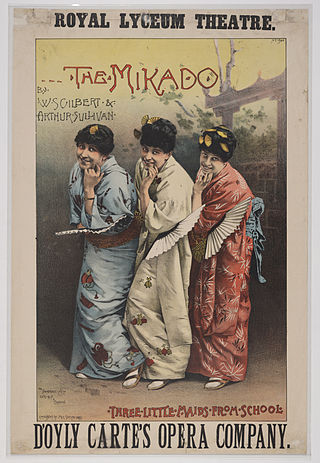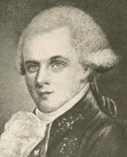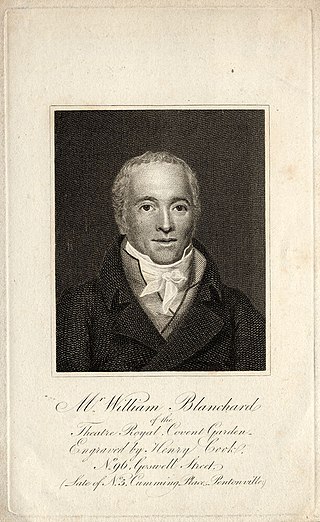
Events from the year 1975 in Canada.

Canada's contemporary theatre reflects a rich diversity of regional and cultural identities. Since the late 1960s, there has been a concerted effort to develop the voice of the 'Canadian playwright', which is reflected in the nationally focused programming of many of the country's theatres. Within this 'Canadian voice' are a plurality of perspectives - that of the First Nations, new immigrants, French Canadians, sexual minorities, etc. - and a multitude of theatre companies have been created to specifically service and support these voices.
James Mavor Moore was a Canadian writer, producer, actor, public servant, critic, and educator. He notably appeared as Nero Wolfe in the CBC radio production in 1982.
The Old American Company was an American theatre company. It was the first fully professional theatre company to perform in North America. It also played a vital role in the theatre history of Jamaica. It was founded in 1752 and disbanded in 1805. It was known as the Hallam Company (1752–1758), the American Company (1758–1785) and the Old American Company (1785–1805). With a few temporary exceptions, the Company enjoyed a de facto monopoly of professional theatre in the United States until 1790.

The National Theatre School of Canada is a private institution of professional theatre studies in Montreal, Quebec. Established in 1960, the NTS receives its principal funding from grants awarded by the Government of Canada and cultural ministries in each province, with added financial support from private and corporate donors. It has offered incomparable training to actors, directors, playwrights, set and costume designers and production specialists to work in professional theatre.

Sir Simon Russell Beale is an English actor. He has been described by The Independent as "the greatest stage actor of his generation". He has received two BAFTA Awards, three Olivier Awards, and a Tony Award. For his services to drama, he was knighted by Queen Elizabeth II in 2019.

William White was the first and fourth Presiding Bishop of the Episcopal Church of the United States, the first bishop of the Diocese of Pennsylvania (1787–1836), and the second United States Senate Chaplain. He also served as the first and fourth President of the House of Deputies for the General Convention of the Episcopal Church.

American Savoyards was an Off-Broadway and touring repertory theatre company that produced light operas, principally the works of Gilbert and Sullivan, in New York City and on tour between 1948 and 1967.
John Juliani was a Canadian actor, writer, producer, director and educator. His career spanned four decades in a number of different media, including radio and film. In addition to his artistic contributions, Juliani was a strong advocate of Canadian theatre and the arts. He is the father of actor Alessandro Juliani.
Beeston's Boys was the popular and colloquial name of The King and Queen's Young Company, a troupe of boy actors of the Caroline period, active mainly in the years 1637–1642.

Founded in 1901, The Savoy Company is the oldest amateur theater company in the world dedicated solely to the production of the 13 surviving comic operas of Gilbert and Sullivan. Based in Philadelphia, Pennsylvania, the Savoy Company has performed at the spacious Academy of Music and Longwood Gardens, where it was invited by founder Pierre S. du Pont.
Queen Henrietta's Men was an important playing company or troupe of actors of the Caroline era in London, England. At their peak of popularity, Queen Henrietta's Men were the second leading troupe of the day, after only the King's Men.

Lewis Hallam Jr. was an England-born American actor and theater manager, son of Lewis Hallam, one of the pioneers of Theater in the United States, and Sarah Hallam Douglass. He was the leading actor of the Old American Company, at the time the only theater in America, and the manager of the same Company in 1779-1796.

Shakespeare in the Park is a term for outdoor festivals featuring productions of William Shakespeare's plays. The term originated with the New York Shakespeare Festival in New York City's Central Park, originally created by Joseph Papp. This concept has been adapted by many theatre companies, and over time, this name has expanded to encompass outdoor theatre productions of the playwright's works performed all over the world.

William Blanchard (1769–1835) was an English comedian.
Helena Spinacuta, was a Swedish stage actress, acrobat, and tightrope artist. She was married to the famous Italian (Venetian) acrobat Antonio Bartolomeo Spinacuta.

Kate Horn was a Canadian stage actress and theater director. She was a popular actress and was the managing director of the Theatre Royal, Montréal from 1873 to 1880.
Anne (Amelia) HillnéeFairbrother was a Canadian stage actress and ballet dancer. She was a popular actress and dancer during her active years in 1846–1861; after her retirement, she had a second career as a dance instructor, in which she also attained fame.

The Theatre Royal in Montréal in Canada, also known as the Molson Theatre was the first public theatre in Canada. It was inaugurated in 1825, was given a new building in 1851, and closed in 1930.

Ralph Wewitzer (1748–1825) was an English actor. He won critical acclaim in supporting parts, but was never given leading roles. He had a 44-year acting career, and is thought to have learned over 400 speaking parts.











